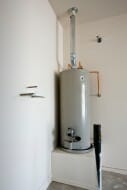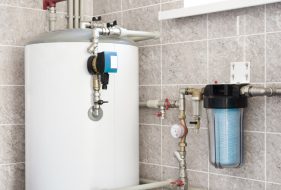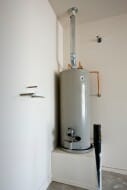Water Heater Maintenance: Simple Steps for a Longer Lifespan
A little attention goes a long way in keeping your water heater running efficiently. By checking for issues, performing regular maintenance, and making small upgrades, you can extend the lifespan of your water heater, save money on energy bills, and enjoy reliable hot water.
Inspect for Leaks and Strange Noises
Every few months, check the tank and connections for leaks, rust, or corrosion. Even small drips can signal a bigger problem down the line. Listen for banging or popping sounds, which could mean sediment buildup inside the tank. If you hear these noises, it’s time for a flush.
For the best results, schedule an annual water heater inspection with a professional. A technician can catch potential problems early and ensure your water heater runs at peak efficiency.

Flush the Tank Once a Year
Over time, minerals in your water settle at the bottom of the tank, forming sediment buildup. This can:
- Reduce efficiency
- Raise energy costs
- Cause damage to the tank
Flushing the tank once a year prevents these issues. Here’s how:
- Turn off the water supply and power (or gas) to the heater.
- Attach a hose to the drain valve at the bottom of the tank.
- Drain the water into a bucket or safe drainage area until it runs clear.
- Close the valve, remove the hose, and restore power and water.
This simple step boosts performance and extends your water heater’s lifespan.
Check Key Components
Two essential parts keep your water heater in top shape:
- Anode Rod: This rod attracts corrosive elements, protecting the tank from rust. Check it every 1 to 2 years. If it’s less than ½ inch thick or corroded halfway, replace it.
- Pressure Relief Valve: This safety valve prevents pressure buildup inside the tank. Test it by lifting the lever and letting it snap back. If water flows into the discharge pipe, it’s working. If not — or if it leaks after testing — replace it.
Set the Right Temperature
For optimal efficiency, set your water heater to 120°F. This:
- Reduces energy use
- Minimizes sediment buildup
- Helps prevent scalding
Adjusting the thermostat is an easy way to extend your water heater’s lifespan while improving water heater efficiency and safety.
Insulate for Efficiency
If your water heater is in a garage, basement, or other cold space, insulation helps reduce heat loss and lower energy bills.
- Wrap the tank in a water heater blanket.
- Cover exposed pipes with foam insulation.
These simple upgrades protect your water heater, helping it last longer while reducing wear and tear.
Combat Hard Water
If your home has hard water (high in minerals like calcium and magnesium), it can cause scaling and sediment buildup, reducing efficiency and clogging pipes.
Installing a water softener helps:
- Protect your water heater and plumbing
- Extend the lifespan of your system
- Improve overall water quality

Ensure Proper Ventilation and Clearance
For gas water heaters, proper ventilation is key to safety and efficiency. Make sure:
- Vents are unobstructed.
- The area around the heater is clutter-free.
- If your home has a closed water system, an expansion tank is installed to relieve pressure and prevent damage.
Why Regular Water Heater Maintenance Matters
Taking care of your water heater isn’t just about preventing breakdowns; it’s about ensuring reliable hot water, lower energy bills, and fewer repair costs. With just a little effort, you can keep your system running smoothly for years.
Maintaining your water heater doesn’t have to be complicated. By performing regular inspections, flushing the tank, checking key components, and adding insulation or a water softener, you can enjoy long-lasting performance and fewer headaches.
The post How to Extend the Lifespan of Your Water Heater appeared first on Modernize.

